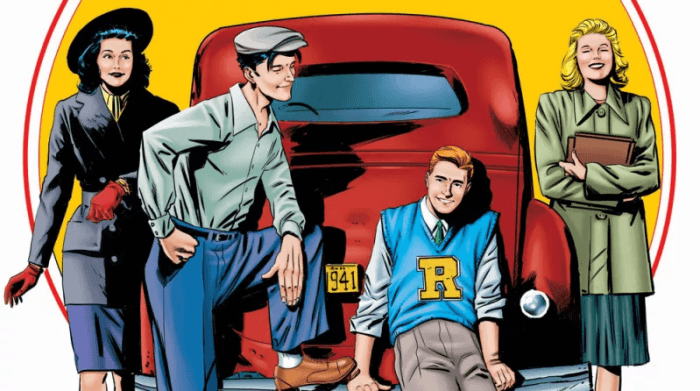Archie Goes Back to 1941, But Not Back to Humor
FTC Statement: Reviewers are frequently provided by the publisher/production company with a copy of the material being reviewed.The opinions published are solely those of the respective reviewers and may not reflect the opinions of CriticalBlast.com or its management.
As an Amazon Associate, we earn from qualifying purchases. (This is a legal requirement, as apparently some sites advertise for Amazon for free. Yes, that's sarcasm.)

The Archie contingent of my collection has been growing significantly in the past few years -- not because of RIVERDALE or the new take on the Archie Comics characters, but because I have a ten-year-old comics reader who loves the classic stuff. We have shelves of Archie digests picked up at Wal-mart and Half Price Books, as well as some hardcover collections from various eras. One of those collects stories from the 1940s, when Chick (as Archie was called in his first appearance) first met Betty as she moved in next door. The later stories involved Betty and Veronica organizing dances for soldiers, as well as other references to the ongoing war effort.
So taking Archie back to 1941 isn't a huge stretch. If anything, it's a return to the character's roots -- although in a more serious vein. There are references to the many goofball antics that happened during the high school years -- the years that are still visible in the rearview mirror as Archie and the gang graduate -- but we don't see any of them happen. When Archie gets smacked in the face by a ball at the beach, his response is to slam a haymaker into Reggie Mantle's jaw. When he's asked about his dour attitude, he has no answers and gets more dour.
It's not a bad concept. We can figure out that what's really weighing on Archie's mind is the activity in Europe, and the potential for America to get involved in it. And more than likely, the story telegraphs that Archie Andrews is probably going to want to do something about it -- or maybe not do something about it. He's that ambivalent in this chapter.
The tale takes some leaps of logic to follow. In one scene, a lost-in-thought Archie is making a puddle in the front yard, daydreaming when he's supposed to be watering the lawn. When his father yells at him, Archie ends up spraying him in the face. It could have been a classic Archie comedic moment, but Fred Andrews is nobody's fall guy. But what's more striking is that Archie responds as though he's been asked a question. "Why does everybody keep asking me that?" I had to go back and review the last few panels -- nobody asked him anything. So either Archie's really not paying attention, or somebody in editorial wasn't.
This isn't the only instance in the script where the sequence of the scenes don't make sense. On Archie's 18th birthday, Betty Cooper gives him a present -- a framed photo of the two of them. But even that doesn't cheer up old down-in-the-mouth Archie, and he apologizes before walking away, carrying the frame with him. And then in the next panel, we see that the broken frame is laying on the sidewalk. We never saw him drop it -- in fact, we watched him walk off with it. And yet, there it is, sending some sort of broken-relationship symbolism or something.
Brian Augustyn's artwork is a superb capture of the 1940s, and his realistic approach to the characters retains all their qualities that make them uniquely recognizable. Mark Waid's script is another take on the "let's do Archie seriously" style, and the era provides an interesting venue for this to play out, although it's lack of details requires the reader to put in some effort to fill in the blanks.
ARCHIE 1941 is definitely one we'll be following a bit further to see where it's going.


